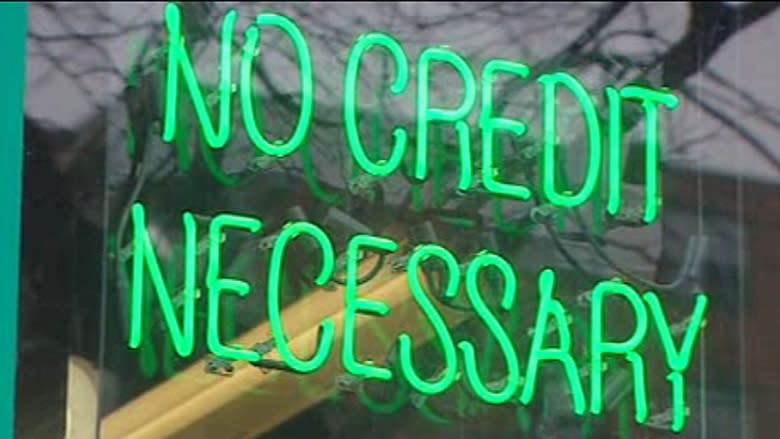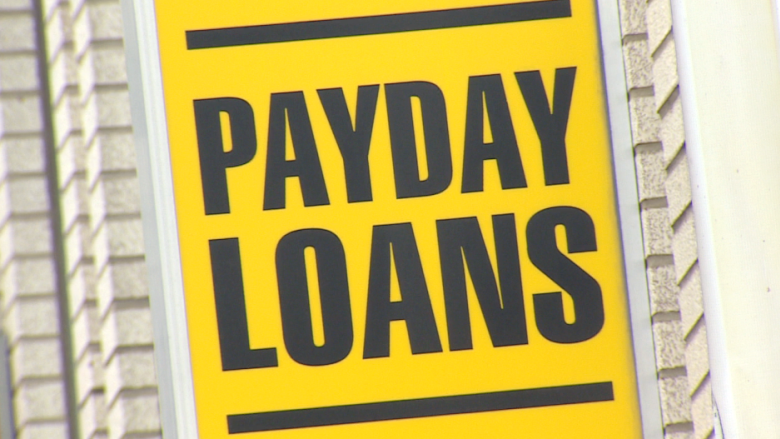When money trumps 'education' for payday loan users
At first blush, the findings of a new payday loan survey seem to confirm the obvious: most people say they only go to high-interest moneylenders because they have no alternative.
But the figures raise another question: Are mainstream banks leaving thousands of marginalized Canadians behind?
It's a conclusion reached as part of a Canadian Centre for Policy Alternatives paper released Monday highlighting a survey of 268 members of ACORN, a national organization of low and moderate income families. ACORN has been a vocal critic of the payday loan industry.
The vast majority of respondents said they turned to high interest financial services because they couldn't get credit or overdrafts from their banks.
Most also said they need short term infusions of cash to pay for food and housing or simply to "alleviate poverty."
"The results of this survey show that the banks, through denying low- and moderate-income families access to credit, are driving people to access fringe high-interest products like payday loans, installment loans and more," the paper concludes.
'Ineligible for more credit'
While ACORN and the Centre for Policy Alternatives may act as advocates, the results of their study echo results of research put out last month by the Financial Consumer Agency of Canada (FCAC).
The agency has been tasked with raising public awareness about the costs of payday loans.
The FCAC conducted a survey of 1,500 payday loan borrowers last spring in which more than 60 per cent of respondents said they didn't have access to a credit card and 88 per cent said they didn't have a line of credit.
The FCAC reached essentially the same conclusion as ACORN, saying "while some borrowers may be unaware of options available at traditional financial institutions, others may have been ineligible for more credit."
But where ACORN calls for the banking sector to provide low-interest credit for emergencies, low-interest overdraft protection and a lowering of penalties for bouncing cheques, the FCAC calls for more education.
"These findings confirm the need to continue to raise consumer awareness about the costs of, and alternatives to, payday loans," the FCAC report says.
"FCAC will promote consumer education resources to assist consumers in understanding the alternatives and their relative costs."
'We all have our role to play'
It's hard to imagine pamphlets and a public awareness campaign will provide much solace to payday loan customers who are likely already only too aware of just how limited their financial choices are.
That's presumably why they're getting payday loans.
"There's no question that our industry exists because the customers who come to our members' locations have been unable to access credit elsewhere," said Tony Irwin, president of the Canadian Consumer Finance Association, an organization which — until last summer — was known as the Canadian Payday Loan Association.
"If there are different ways that some of these circumstances can be made different or improved, then that's a good thing. But there will always be a need for this type of credit. Whether banks or credit unions or our industry, we all have our role to play."
Irwin points to a research paper released last month by the Conference Board of Canada which said the licensed payday loan industry is expected to issue nearly 6 million loans to Canadians this year for a total value of $3 billion.
So it's not like these are numbers a bank couldn't love. But they come at a price.
"The payday loan industry has an unfavourable image with the public, and politicians and the media mainly discuss it in a negative light," the conference board report says.
"Despite its unfavourable reputation, the licensed payday loans industry provides a necessary service for cash-strapped Canadians who lack access to alternate sources of credit in times of need."
Thanks for the advice. How about some $$$?
Like the FCAC, the conference board also suggests the need for more consumer financial literacy.
For its part, the Canadian Bankers Association says many Canadians may not realize the range of products and services which might serve as alternatives to payday loans.
There is a 'but' though.
"Banks have a strong interest in working with their clients who are facing financial difficulty," the association's website says.
"However, they also believe that providing additional credit to someone who already has trouble managing their debt is not helping that person."
ACORN member Anna Kowaleski says she has used payday loan services. She lives on a disability income which leaves her extremely limited funds after the basics are paid.
It's not education she needs as much as money. She says she wishes she could get it from a bank.
"I do want overdraft protection. I want banks to offer small loans, no fee accounts, lines of credit, maybe low interest credit for emergencies similar to what payday places use but without interest," she says.
"If I could go to my bank and say 'I have no money for food this month, could you spot me $150 and it's less than 500 per cent interest, I'd be happy dealing with my bank."
Advice, as they say, is free.


